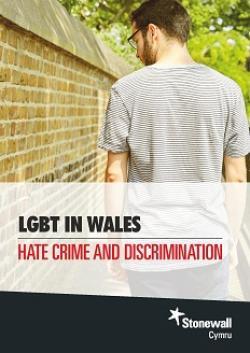LGBT in Wales - Hate Crime and Discrimination
- Almost one in four LGBT people (23 per cent) have experienced a hate crime or incident due to their sexual orientation and/or gender identity in the last 12 months.
- Half of trans people (52 per cent) have experienced a hate crime or incident because of their gender identity in the last 12 months.
- Four in five LGBT people (82 per cent) who experienced a hate crime or incident didn't report the incident to the police.
- One in ten LGBT people (10 per cent) who were looking for a house or apartment to rent or buy in the last year felt discriminated against.
LGBT in Wales - Hate Crime and Discrimination is Stonewall Cymru's new research highlighting the shocking levels of hate crime and discrimination that LGBT people still face in Wales today.
Based on YouGov polling of over 1200 LGBT people in Wales, the research reveals that anti-LGBT abuse extends far beyond acts of hate and violence on our streets. Many LGBT people still endure poor treatment while using public services and going about their lives, whether in their local shop, gym, school or place of worship.
Key findings
- Hate crime: Almost one in five LGBT people (23 per cent) in Wales have experienced a hate crime or incident due to their sexual orientation and/or gender identity in the last 12 months
- The number of lesbian, gay and bi people in Wales who have experienced hate crime has increased by 82 per cent, from 11 per cent in 2013 to 20 per cent in 2017
- Half of trans people (52 per cent) have experienced a hate crime or incident because of their gender identity in the last 12 months
- Four in five LGBT people (82 per cent) who experienced a hate crime or incident didn’t report it to the police
- Youth: Two in five LGBT young people age 18-24 (43 per cent) have experienced a hate crime or incident based on their gender identity and/or sexual orientation in the last year. Just 12 per cent of these people report it to the police
- Disability: LGBT disabled people are more likely to have experienced a hate crime or incident based on their sexual orientation and/or gender identity: 30 per cent in the last year compared to 20 per cent of non-disabled LGBT people
- Safety in public: A third of LGBT people (30 per cent) avoid certain streets because they do not feel safe as an LGBT person there. Two in five LGBT people (39 per cent) would not feel comfortable walking down the street while holding their partner's hand. This increases to three in five gay men (57 per cent)
- Housing: One in 10 LGBT people (10 per cent) who were looking for a house or apartment to rent or buy in the last year felt discriminated against
- Bars and restaurants: One in five LGBT people (19 per cent) who visited a café, restaurant, bar or nightclub in the last 12 months have been discriminated against based on their sexual orientation and/or gender identity
What respondents said
I had bleach thrown at me, bricks through the windows, I had fireworks taped to the windows and blown out and my boyfriend was beaten half to death.
Gethin, 42
I was assaulted by a man whilst I was holding hands with my lesbian partner. He grabbed me from behind and thrust himself into me, then verbally attacked me.
Freya, 21
Once I was walking a friend to their university because they were feeling suicidal, so I was holding their hand. A man I did not know spat at me and hissed "dyke" at me.
Alex, 23
What you can do
Stonewall Cymru has made the following recommendations for all individuals who want to help tackle anti-LGBT hate crime and discrimination:
- Call out online anti-LGBT abuse whenever you see it, so long as it is safe to do so. Support those being targeted by letting them know you are an ally
- Let local business owners know if you witness an anti-LGBT incident from staff or other customers so that they can tackle it. Make clear that they could risk losing you and others as customers if they don’t
- Report incidents of homophobic, biphobic or transphobic discrimination you experience when accessing public services like housing or social services to the service provider or local council so they can take action.



